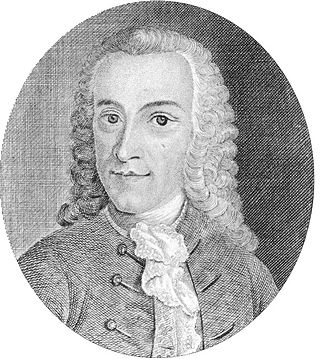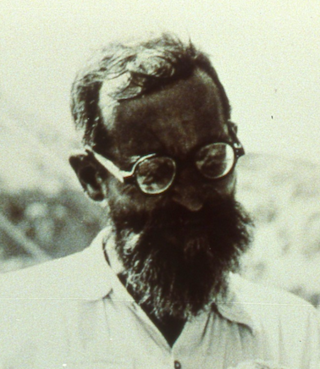
Frederic-Hans von Rosenberg was a German diplomat and politician. He served as Reichsaußenminister in the cabinet of Wilhelm Cuno in 1922–1923.

Felix Dahn was a German law professor, German nationalist author, poet and historian.

Tobias Mayer was a German astronomer famous for his studies of the Moon.

Roland Guérin de Vaux was a French Dominican priest who led the Catholic team that initially worked on the Dead Sea Scrolls. He was the director of the Ecole Biblique, a French Catholic Theological School in East Jerusalem, and he was charged with overseeing research on the scrolls. His team excavated the ancient site of Khirbet Qumran (1951–1956) as well as several caves near Qumran northwest of the Dead Sea. The excavations were led by Ibrahim El-Assouli, caretaker of the Palestine Archaeological Museum, or what came to be known as the Rockefeller Museum in Jerusalem.

The Göttingen Academy of Sciences is the oldest continuously existing institution among the eight scientific academies in Germany, which are united under the umbrella of the Union of German Academies of Sciences and Humanities. It has the task of promoting research under its own auspices and in collaboration with academics in and outside Germany. It has its seat in the university town of Göttingen. Its meeting room is located in the auditorium of the University of Göttingen.
Miriam Lichtheim was a Turkish-born American-Israeli egyptologist, known for her translations of ancient Egyptian texts.
L'Année philologique is an index to scholarly work in fields related to the language, literature, history and culture of ancient Greece and Rome. It is the standard bibliographical tool for research in classical studies. Published in print annually since 1928, with the first volume covering the years 1924–1926, it is now also available online by institutional or individual subscription. As of June 2014, the electronic version covers volume years 1924 through 2011. The editorial staff gathers each year's additions from 1,500 periodicals, with an additional 500 articles from collections.
Glenn Warren Most is an American classicist and comparatist originating from the US, but also working in Germany and Italy.

Elisabeth Cruciger, a German writer, was the first female poet and hymnwriter of the Protestant Reformation and a friend of Martin Luther.
Friedrich Wilhelm Karl, Ritter von Hegel was a German historian and son of the philosopher Georg Wilhelm Friedrich Hegel. During his lifetime he was a well-known and well-reputed historian who received many awards and honours. He was one of the major urban historians during the second half of the 19th century.
Winfried Bühler was a German classical philologist.
Luc Brisson is a Canadian historian of philosophy and anthropologist of antiquity. He is emeritus director of research at the CNRS in France, and is considered by some of his colleagues and students to be the greatest contemporary scholar on Platonism.

The Evangelische Kirchenlexikon (EKL) is a theological lexicon published by Vandenhoeck & Ruprecht, Göttingen. The first edition appeared in three volumes from 1955–1959, and a register volume followed in 1961. The second edition was an unchanged reprint published in 1962. The editors were Heinz Brunotte and Otto Weber. Erwin Fahlbusch was responsible for the publication of the third, revised edition from 1986–1997 in collaboration with numerous specialist scholars.
Rudolf Vierhaus was a German historian who mainly researched the Early modern period. He had been a professor at the newly founded Ruhr University Bochum since 1964. From 1971, he was director of the Max-Planck-Institut für Geschichte in Göttingen. He became known for his research on the Age of Enlightenment.

Jens Hacke is a German political scientist and author.
Arthur B. Groos is an American philologist, musicologist, medievalist and Germanist.
Alfred Bammesberger is Professor Emeritus of English and Comparative Linguistics at the Catholic University of Eichstätt.
Hartmut Lehmann is a German historian of modern history who specializes in religious and social history. He is known for his research on Pietism, secularization, religion and nationalism, transatlantic studies and Martin Luther. He was the founding director of the German Historical Institute Washington DC and was a director of the Max Planck Institute for History. He is an emeritus honorary professor at Kiel University and the University of Göttingen.
Heidrun E. Mader is a German Protestant theologian and historian of early Christianity and its literature, and a professor at the University of Cologne, Germany, holding a chair of Biblical Literature and its Reception History.








